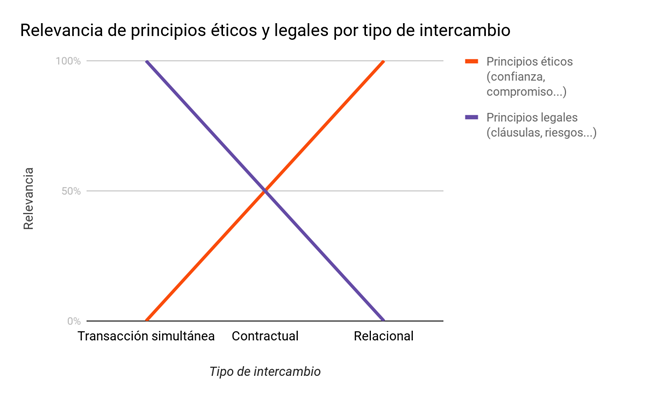There is no doubt that in medium or long term business relationships, when the exchange between the different parties is not instant, you need to establish standards that try to guarantee the interests of each one.
In this scenario, trust and risk sharing (financial, reputational, etc.) play a fundamental role. Finding this balance between control and trust is not always easy.
The complexity of the environment and the very nature of the business, such as the Internet and digital products, can generate a degree of uncertainty that can tip the balance towards the control side, when what really helps us achieve success is a good relationship of trust and collaboration.

One of the main purposes of contracts is protection against opportunism. The lack of trust leads to very rigid and detailed contracts, in an attempt by both parties to protect themselves.
Gundlach and Murphy represent in the following graph the relevance of ethical principles (such as trust and commitment) and legal principles (clauses of contracts) in a commercial transaction, depending on the type or nature of the exchange.
[caption id="" align="aligncenter" width="645"]
Ethical and legal foundations of relational marketing exchanges. Gregory T Gundlach and Patrick E Murphy (1993).[/caption]
By simultaneous transaction we understand, for example, when we buy a software already developed (a product with its characteristics already implemented and in operation) for a certain price or conditions.
There is no risk, no need for trust, the exchange is clear and immediate. The opposite extreme would be a relational exchange, complex transactions within a long-term alliance (partnership between companies).
Finally, we have the contractual type, where we are at most of the time in our sector. In this type of exchanges, both the obligations and the duties of both parties are complex and can hardly be collected as legal clauses in the contract.
Therefore, ethical principles such as trust and commitment are equally important and fundamental.
So, is everything in order?
In the software industry, in general, there is a lot of frustration on the part of suppliers and customers due to a continuous breach of expectations and an uncooperative work environment. The reason is simply because they use an obsolete relationship model for the new digital age.

The approach so far has always been to treat software development according to traditional project management, where the only objective is to comply with a scope in a given time and with a fixed cost.
This type of management needs a contractual model that fixes these 3 aspects and includes control mechanisms to avoid risks and deviations of each one of them. But this approach has many problems.
This narrow scope arose in an attempt to generate a "sense of security". However, the reality is that it does not benefit anyone:
- Closed requirements in a very initial phase, where there is still much to discover and align.
- Little flexibility and adaptation to change.
- Costly change management that hinders the customer-supplier relationship. Time and effort are lost in negotiations that do not contribute.
- Complex management of expectations. The false sense of security leads to acquire commitments with third parties that are hardly fulfilled.
If that wasnt enough, time and cost limits are also imposed, which we have to meet with that scope, not taking into account the following problems:
- Estimates based on an initial scope that will undergo modifications.
- Software complexity. Software development is a process influenced by a large number of known and unknown variables, which makes its predictability difficult.
- Little integration, lack of team union. The development team focuses on complying with a customer imposition, which reduces the level of commitment and motivation. Everyone involved (client and supplier) should feel part of the same team.
- The important thing is not to deliver something of value, but to fulfill your task.
Even so, a few years ago, the same thing worked, based on managing scope changes by having a large margin in the estimates. But today, with the frenetic pace of the digital market, it is totally insufficient.
What if the competition moves ahead or the market changes its trend? What if the users expected something else and use or visits decline? What if there are changes or technological dependencies that affect us? What if people are unmotivated and do not want to continue on the team?
If we ignore all these questions, which are the order of the day, we will never achieve success.
Let's change the focus!
You can comply with the three vertices of the iron triangle and even then the project is a failure, where you have invested time and effort that does not cover the needs or expectations of the interested parties. So, what is success?
Success is to build a product that provides value to the market and users, as a result of teamwork and continuous improvement. Without forgetting the time and cost that is available.

If you look at this definition of success, there are three key points:
- Digital products must be built! I refer to being versatile and dynamic, able to adapt to changing business and technological needs.
- The focus is to generate value! Differentiate ourselves in the market and / or that users are increasingly happy with the use of the product. The concept of value should be qualified depending on the nature and reality of the client. That the way to work and generate that value, improve continuously, being more and more efficient.
- Team satisfaction! That everyone involved (from the one who invests in the product to the one who uses it, going through all those who will work in its construction) believe in it and be happy with the work that is done and the results that are being obtained.
In short, success is achieved by changing the focus from classic project management to product development, with a common vision, teamwork, trust and collaboration. Observing and analyzing the environment, making decisions to adapt to it and being more agile in our way of working.
Bases for the new approach
If complying with scope, time and cost is not enough to ensure success, why do we use contractual models that only care about controlling these three factors? And this, precisely, is the reason for the high level of dissatisfaction in the software industry, we do not use contracts that help us get the projects right.
We are not the first to realize that contractual models do not always work in all scenarios or for any type of relationship. There is a trend, called Proactiving contracting, which tries precisely to evolve the contractual models to favor a framework of collaboration and seek the common benefit over rigid and excessively detailed contracts.
That is, that the objective of the contract is to gather what is necessary to achieve success and not cover all cases of opportunism that occur to us.
For this, three levels of action are identified, in which the different measures are classified, with the intention that there is a greater number of them aimed at preventing problems and achieving the satisfaction of both parties (primary level measures).:
- Primary (oriented to causes): measures to promote the relationship and communication in order to prevent problems from arising. Example: awareness campaign of the DGT: "If you drink do not drive".
- Secondary (effects oriented): measures to minimize the effects of problems that arise. Example: Fines for positives in a blood alcohol control.
- Tertiary (oriented to consequences): measures to manage the consequences of large-scale conflicts. Example: legal penalties for accidents under the effects of alcohol.
These types of trends do nothing but reveal that it is more beneficial to focus the contract on what we have to do to make it a success for all, above how we can protect ourselves from possible conflicts and breaches.
For this, the first step is to support cooperation and teamwork. With trust, collaboration and transparency, the degree of commitment to the product we are building is greater, improves our involvement and encourages the feeling of being a single team, which translates into a better job and greater productivity.
Along with these principles, another of the key foundations is to focus both the relationship model and the team's own effort in generating value. This is what will optimize the time and cost that is available to build a product, which is adjusted to the real needs, which contains the most important to bring something different to the market and users.
At Paradigma we bet on this new approach that fits our culture so we are working on new relationship models that focus on offering mechanisms that guarantee success.
On the one hand, return to our principles, which guide the good work of Paradigma every day. Incorporating tools that guarantee collaboration and complete transparency, that favors cooperation and work side by side with our customers, business and IT forming a single team.
And on the other hand, to bet on the value, guiding the developments to the business value, involving the end users to know their desires and needs, motivating the teams so that they share the business vision and commit to it. We achieve this thanks to different metrics that help us to continuously improve what and how, so we can guarantee the satisfaction of users, customers and teams.
Comments are moderated and will only be visible if they add to the discussion in a constructive way. If you disagree with a point, please, be polite.




Tell us what you think.